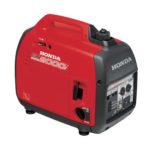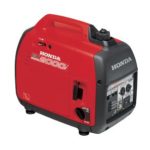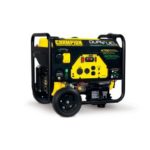When it comes to generators, the two main types are inverter generators and conventional generators. While they serve different purposes, many factors must be considered when deciding which is best for you.
To help make that decision easier, we’ve compiled this blog post with everything you need to know about these two generator types.
What is a Conventional Generator?
A conventional generator is a device that converts mechanical energy into electrical energy. They are also known as alternators or dynamos.
Conventional generators operate on Faraday’s law of induction, which states that an electromotive force is produced when a conductor cuts a magnetic field. The magnetic field cuts the conductor and generates a voltage across it. This voltage moves from one end to the other, producing a current that completes the circuit by returning to its point of origin.
Regarding secondary distribution, conventional generators use single-phase distribution wire and produce 120 volts of electricity at 60 cycles per second (60 Hz).
Conventional generators are the more traditional type of generator. They produce fluctuating voltages and frequencies that can’t be used by your household appliances directly, which means they must first pass through an external device called an “inverter”. These devices convert DC power to AC power.
While conventional generators can produce more power than inverter generators, they have several drawbacks that make them less appealing to some people.
They tend to be heavier and bulkier in size because their engine requires oil for lubrication purposes. This means it must be refilled every 200 hours or so during use, much more often than inverter generators. They also produce higher emissions, making them less environmentally friendly.
What is an Inverter Generator?
An inverter generator is a type of generator that is more energy-efficient than a conventional generator. It does this by converting the AC power coming from the outlet into DC power. Then, it uses an inverter to convert the DC power back into AC power before it’s delivered to the appliance.
The DC motor in an inverter generator doesn’t run continuously like a conventional one and can be turned off or on when needed without stopping the appliance.
One major difference between these two generators is that while both produce noise, an inverter generator produces less overall noise and less sound from its engine. It is considered to be safer and more convenient for camping use.
An inverter generator differs from a conventional generator because it does not produce varying voltages or frequencies like its counterpart. Instead, it produces direct electricity at a 110V capacity to supply energy to your household appliances.
This is possible due to the system’s operating efficiency and lower emissions levels, which require less maintenance than conventional models.
Inverter generators are often used during power outages to make life easier for people in the area.
What are the Main Differences Between an Inverter Generator and a Conventional Generator?
For the most part, the two different types of generators serve different purposes. An inverter generator is best used in low-demand applications that may need to use more load at certain points during the day.
Charging batteries, running compressors, or powering construction equipment are all inverter generator uses. A conventional generator would be required for larger projects that require large amounts of power to run.
Unlike conventional generators, inverter generators produce a stable, high-quality electrical current. This is because they generate power in a more constant and controlled manner. Inverter generators also have a higher efficiency rate than conventional generators, so they will use less fuel while producing the same amount of energy.
The downside to inverters is that they are much more expensive upfront due to their design complexity and the materials used to construct their components. Inverters also run quieter than conventional generators but can be just as loud if not properly maintained.
Conventional generator types have been around for years and typically cost less upfront due to their simple design. They also require minimal maintenance compared to inverter-type generators because there is only one moving part in the electrical system.
Conventional generators also have a low startup time, but they are less efficient than inverter-type power sources and can’t run as quietly when in use.
Conventional generators are ideal for backup power at construction sites or any other place where you’ll need a generator that’s quick to start up and requires little upkeep while providing a constant power supply.
They also tend to be less expensive than inverter-type generators, so they’re a great choice if you don’t need the most efficient and quietest generator for your home or business.
Related: Best Inverter Generators
Which is Better, an Inverter Generator or a Conventional Generator?
If you need a generator for emergencies but don’t want the noise, then an inverter generator might be right for you. They’re better at handling computers, televisions, and other sensitive appliances because of how stable their power output is (unlike conventional generators).
Inverter generators are a bit pricier and less powerful than conventional ones, making them better for smaller appliances/appliances that require less power.
A conventional generator is great for heating systems and furnaces due to its long run time, low cost, and reliable performance.
If you’re looking for a generator that will run smoothly and provide you with plenty of power, then an inverter generator may be the solution. These generators produce clean power and better efficiency than conventional generators. However, these generators don’t produce as much power as conventional generators.
A conventional generator is your best choice if you need more power than an inverter generator.
Conclusion
After reading this blog post, you should have a much better understanding of the differences and similarities between inverter generators and conventional generators. The decision-making process for which generator best suits your needs has become easier with all the information provided.
If you’re still not sure about what type of generator would be best for you or if any questions need answering after reading through our blog, please feel free to contact us.



